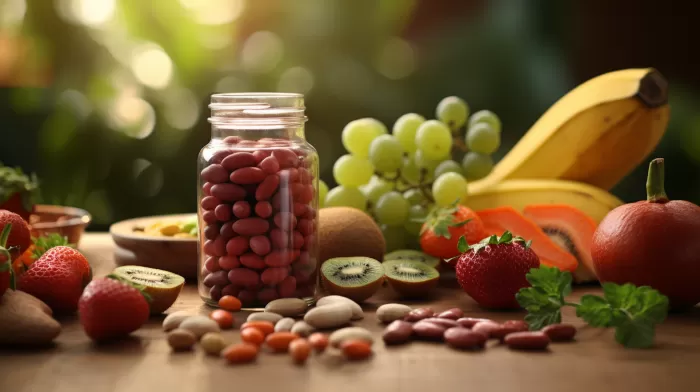If you’ve ever had heartburn, gas, or bloating, you’ve suffered from inadequate digestion, and who among hasn’t suffered these maladies more often than not? Quite often these annoying and sometimes chronic symptoms occur when the foods you eat are not broken down well enough in your mouth and stomach. This prevents you from absorbing the nutrients your body so desperately needs through the wall of your small intestine, and sends your stomach and intestines into overdrive trying to get chunks of undigested food out of your system.
What causes inadequate digestion and what can you do about it? You’re about to find out. (And don’t worry—you won’t be relying on your acid suppressing medications much longer!)
Mom always said, “Chew your food!”
The first step to digesting foods properly is… chewing. Just like mom said, right? It may sound obvious, but you’d be amazed how many people don’t chew their food completely and then suffer the digestive consequences. It’s also important to know that, the older you are, the more you should chew. As we age a lot of our b…
The importance of digestive enzymes
How do nutrients from healthy, whole foods get into your blood to fuel every cell in your body? Firstly, the foods you eat must be broken down to microscopic size, allowing absorption into your blood stream. This absorption occurs through the mucosa. This thin layer of intestinal cells takes in nutrients, repels bigger particles, and even promotes the growth of healthy bacteria.
It all starts in the mouth. Chewing helps break these particles down to proper size, but digestive enzymes are essential as well. Some enzymes are present in your mouth, and help break down foods like bread and convert them into sugars. This all occurs before the food even gets to your stomach.
The stomach also contributes a number of digestive enzymes like gastrin (which stimulates stomach acid secretion) and pepsin (which breaks down proteins). However, these substances need to be activated and released into your digestive system.
This can be a problem when you eat refined or processed foods that don’t contain enough natural fiber. Sufficient digestive enzymes aren’t released. Stomach acids are produced less because the body “thinks” you need them less. And the result? Gas and bloating from undigested food!
Why you must eat natural whole foods
Even if digestion and absorption occur as planned, what about the assimilation of nutrients? Is the food you’re eating getting assimilated into your cells? Sometimes yes, sometimes no.
Unfortunately, when you eat refined and processed foods, many of the food molecules absorbed into your cells are synthetic. They are not the natural foods your cells need for optimal health because the more a food is processed, the less it resembles its original nutrient-rich state. Once these unhealthy molecules enter your cells, they start to disrupt your cellular function.
This can cause a wide variety of health problems. You know,”Garbage in, garbage out!” Another old-fashioned saying mom probobly shared with you. There’s a reason she’s “the mom.”
Natural foods have the opposite effect. Consider the omega3 fatty acids found in fish oil, olive oil, and flax oil. Once they’re assimilated into your cells, these healing substances soothe inflammation, build healthy tissue, balance pH, and reduce chronic illness across the board.
The take home message? You can’t eat packaged, processed, and refined foods and expect to be healthy. Fill your diet with nutrient rich whole foods instead. Your body will thank you!
Take digestive enzymes for heartburn relief
When you eat processed or refined foods, it can cause your stomach acid to get too low during meals. This, in turn, can cause an overproduction of acid between meals, which leads to the heartburn that is so common in our society. And you’ll be amazed how common it is!
Ultimately, the goal is a dynamic interplay between stomach acid, healthy bacteria, and digestive enzymes, combined with a fully functioning lining in your small intestine. When you have all these things working in tandem, the result is powerful, healthy digestion!
Safe, natural, and effective digestive aids
The amino acid Lglutamate (glutamic acid) activates the digestive enzyme pepsin in your stomach, which helps your body assimilate protein. Taken along with betaine hydrochloride (betaine HCL), Lglutamate can also help ensure a proper pH for your entire digestive tract.
But these aren’t the only good things about Lglutamate. This amino acid is also the single largest contributor to intestinal energy and absolutely essential for learning and memory.
Another powerful digestive aid is gentian root. This herb promotes the flow of saliva, gastric juices, and bile. In Germany, it’s an approved medicine for loss of appetite, fullness, and flatulence. In Britain, it’s recommended for acid stomach, healthy G.I. function, and nausea.
In conclusion, you can put an end to your heartburn, gas, and bloating. I’ve seen it happen in almost all of my patients who 1) chew properly at mealtime; 2) stop eating junk food; 3) eat whole foods predominantly; and 4) take digestive enzymes and betaine HCL. These steps will help you reverse your over acidity and return you to a normal stomach and small intestine.
And the best part of all is… you can throw away your acidsuppressing drugs forever!
Chew Your Way to a Happy Tummy: Beat Heartburn and Banish Bloating Naturally



